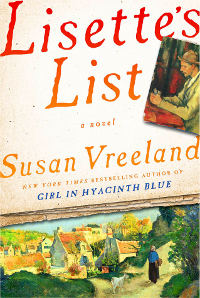|
|
|
|
Book Club Discussion Questions |
|
|
|
2. What were the qualities that Lisette appreciated about André? About Maxime? Did this difference affect her love for both of them? How? 3. As Lisette was becoming more comfortable in Roussillon, what did she find in it that she liked, or even loved? As a reader, did you want her to make this adjustment, or were you holding out for a complete and speedy return to Paris? If she had moved back to Paris right after the end of the war, what would she have lost in addition to the paintings? |
4. What made Lisette so conflicted about Bernard? What allowed her even to speak to him? Every gift he gave her had consequences. Should she have rejected and destroyed each one like she did the stockings? Were all the gifts similarly motivated and did they reveal the same qualities in Bernard? Was he wholly a bad man?
5. What constraints made finding the paintings take so long? How did Lisette's changing emotional state contribute to the delay?
6. Was Héloïse a collaborator? Should she have been punished? Should Bernard have been punished? Should he have been removed from his post? In your mind, did his motives in siding with the Occupiers justify his stance? At one point in the revelation scene between Bernard and Lisette, she said, "I could charge you not just as a thief, but as a collaborator." Why didn't she? Do you respond differently to Bernard and to Héloïse?
7. With Maxime's experience in the art world, he spoke at length in Chapter Twenty-three about what makes a painting great. Is there any criterion that he overlooked? Select a painting you love by any painter and apply Maxime's criteria to it. What insightful observation about life or the world or yourself does the painting offer you?
8. How did the peripheral characters--Maurice, Sister Marie Pierre, Héloïse, Louise, Odette, Madame Bonnelly, Aimé Bonhomme--complement each other in influencing Lisette?
9. Consider the theme of articulation and communication. How did the scenes with Maxime and Lisette in the bories introduce this theme? What characters have a problem with communication? Under what circumstances do actions speak louder than words?
10. The letter by Marc Chagall to the artists of Paris is historically accurate except for mentioning the cause of Bella's death. What effect did this letter have on Lisette, not just in terms of her emotional reaction but her subsequent thinking and actions? What did it make you realize about the possible loss of France's art legacy? What would the effect of that loss be on France and French people? On the world?
11. In what way does Lisette's List of Hungers and Vows differ from the popularized "bucket list" of contemporary usage? What was its purpose for her? Should she have added any hunger or vow that actually motivated her and that was missing? Why wasn't "Participate in the art world in Paris" on her list?
12. In Chapter Sixteen, Lisette considers that it might be a higher art to invent a painting by assembling elements from one's heart like Chagall did rather than painting only what one actually sees. She imagines such a painting of her own. What elements of her own life are reflected in her painting? What elements in your life might be reflected in such a painting if you were to paint your own Chagall?
13. What did you learn about art and its potential effect? About the region? About the Provençal character? About the war? Any war? Did any of these elements change your thinking?
|
|
